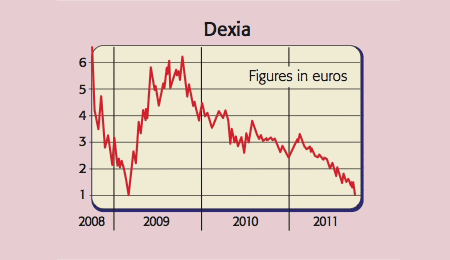
The eurozone debt crisis is threatening to turn into a banking crisis. Greece has confirmed that it will miss its budget deficit target for this year. The EU and the IMF are withholding the latest tranche of rescue package cash, which was supposed to be disbursed by mid-October. They are expected to extract new concessions from Greece before handing over the €8bn.
So much for the first Greek rescue package, agreed in 2010. There were fears this week that part of a second Greek rescue, agreed in July, will unravel. Some governments want this deal, which envisaged haircuts of 21% on Greek debt, to be renegotiated to make investors take bigger losses because Greece’s debt pile has ballooned.
Meanwhile, Franco-Belgian lender Dexia has become the first bank outside the European periphery to need a state rescue owing to the sovereign debt crisis, falling victim to the credit squeeze in the interbank market. The French and Belgian governments have pledged to prop it up. Stockmarkets tanked early this week as a messy Greek default appeared more likely, but perked up mid-week as EU leaders finally began to discuss recapitalising Europe’s weak banks.
Greece drowns
Greece is “drowning in red ink”, said Alan Wheatley on Reuters.com. It is in a debt trap. The declining economy lowers tax revenues, necessitating more austerity, which further dents growth and raises debt. This summer the IMF thought the economy would grow by 0.6% next year. Now it expects a 2.5% contraction. The overall public debt pile is set to climb to 173% of GDP in 2012. Last May the IMF thought it would peak at 149%.
Fears that withholding the latest aid payment could cause a “messy, imminent default” look overdone, however, said Richard Barley in The Wall Street Journal. Greece’s cash should last until November and it doesn’t have to worry about bond redemptions until December. “The delay seems more about ensuring that Greece actually implements” cost cuts.
Revisiting July’s bond deal, however, is “more concerning”, said Barley. It may be hard to persuade bondholders to take more losses and bigger haircuts would just compound worries about banks’ capital. Revising the second Greek bail-out would further dent “the already battered perception of the eurozone’s crisis-management abilities”.
Europe’s credit crunch
Europe’s lacklustre crisis management is the underlying reason for the credit crunch that is now threatening to turn into a banking crisis. “The markets simply do not have faith that a divided and hesitant Europe will be able to meet the challenge of contagion should Greece default,” said the FT.
We’re already seeing contagion in action, said Jean-Pierre Lambert of Keefe, Bruyette & Woods. Since investors and financial institutions can’t be sure how many peripheral countries could end up defaulting and where in Europe’s interlinked banking system the worst losses will occur, they are cutting back on their funding of the system. Solvency worries have caused a liquidity crunch, just as they did in 2008. European banks “are having difficulties borrowing both short and long-term”, said Louise Cooper of BGC Partners.
With interbank lending drying up, Dexia always looked vulnerable. It depends more heavily on wholesale borrowing than any other major European bank, noted Matthew Dalton in The Wall Street Journal. The wholesale market was spooked by its near-€5bn of Greek exposure, among the largest for a European bank. Meanwhile, French banks’ relatively large exposure to peripheral debt is another worry, and jitters appear to have crossed the Atlantic.
The global implications
Rumours, probably unfounded, that Morgan Stanley is heavily exposed to Europe led to a huge sell-off in its shares early this week. Other American banks slid sharply too. This seems to mark “the first time that contagion from the debt crisis in Europe has really taken hold in America”, said Economist.com. In which case, US banks are likely to withdraw further from Europe, worsening the credit squeeze. Europe is becoming “the subprime continent”.
It’s just as well, then, that European policymakers this week turned their attention to a co-ordinated recapitalisation of European banks. International leaders have been “pleading” with their European counterparts for weeks to resolve this issue, said FxPro.com. Still, there are plenty of technical difficulties involved, and European politicians are “two months behind reality”, said David Miller of Cheviot Asset Management. Don’t expect miracles.